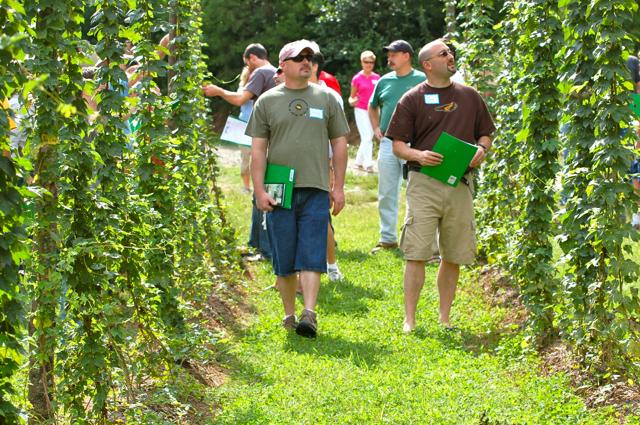At Echoview Farm in Weaverville, hop bines curl upward toward the sun. Hops helps bring out the particular flavors in different styles of beer, owner Julie Jensen explains. And while Western North Carolina’s moist climate is not ideal for large-scale hops production, certain specialty varieties are being cultivated at Echoview, Hop’n Blueberry Farm and through trials at the Mountain Research Station in Waynesville.
Meanwhile, just off Brevard Road near the WNC Farmers Market sits Riverbend Malt House. Its mission, co-owner Brent Manning explains, “is to help unite the local wheat and barley farmers with local brewers outside the commodities market.” Earlier this year, Riverbend’s Appalachian Pale Ale garnered raves from judges and attendees alike at Just Economics’ Just Brew It homebrew competition. This beer was produced using 85 percent locally grown malted barley and hops (the latter from Echoview Farm).
These developments are part of a larger local trend toward sustainable economic growth. From Asheville’s thriving local food culture to the talk of developing a “fibershed” serving the area’s weavers to the developing green-energy technologies, complementary local-business connections are growing synergistically, feeding off one another and spawning new possibilities.
And in year three of Asheville’s reign as BeerCity USA, the vibrant local craft-beer scene shows signs of playing a significant role in developing a sustainable, homegrown economy.
Green beer
Beer is typically crafted by carefully mingling water, malted barley, yeast and hops to produce styles ranging from the light, crisp finish of a pale ale to the rich, heavy flavors of a stout. Happily, this area’s high-quality water is well-suited to brewers’ needs (see “Brews News” elsewhere in this issue). Together with Asheville’s growing reputation as a beer mecca, it could be a factor in the purported interest of Western breweries New Belgium and Sierra Nevada in establishing operations here (see “Head to Head” elsewhere in this issue).
And if those rumors bear fruit, it could be a “game-changer” for the local beer industry, notes Manning.
Inspired by its winemaking neighbors in Napa and Sonoma, Sierra Nevada has been a pioneer in developing its own terroir (the unique combination of factors such as soil, climate and environment that gives a wine or other product grown in a particular place its distinctive character). The annual Estate Harvest Ale is made from hops and barley grown on-site at the Chico, Calif., brewery.
If the company took a similar approach to a WNC operation, it could significantly expand the local market for barley, wheat and hops, Manning points out.
And if, as has been suggested, local breweries were allowed to take advantage of Sierra Nevada’s buying power to cut the cost of imported raw materials, it could conceivably free up funds to help develop the agricultural component of a regional brewing economy, some observers say.
Speculation aside, the track records of both New Belgium and Sierra Nevada suggest that an expanded local brewing sector here could avoid some of the negative environmental impacts that often accompany economic-development efforts.
New Belgium, for example, is an industry leader in utilizing green and sustainable technologies in its brewing process. Whether it’s generating electricity from brewing wastes or encouraging employees to bike to work, New Belgium has demonstrated a significant commitment to reducing its environmental impact.
Sierra Nevada, meanwhile, has made substantial solar and fuel-cell investments, uses wind power and even has a project to produce ethanol from brewing waste to power its vehicles. Such approaches would be a good fit with existing efforts to grow a locally based green economy in WNC.
Budding opportunities
But even if neither Western brewery decides to locate in Asheville, there’s significant potential to build on what’s already happening here, industry observers say. An Aug. 22 Wall Street Journal story on the country’s hottest towns for business startups, for example, included Asheville, specifically citing the city’s beer industry.
Echoview Farm has a machine that converts hop flowers into the pellets large-scale commercial brewing requires. And Riverbend, in cooperation with Jennifer Lapidus of Carolina Ground, is utilizing collective buying power, economies of scale and cooperative milling practices to help grow the agricultural component of WNC’s brewing industry.
Meanwhile, the Blue Ridge Sustainability Institute and Asheville Independent Restaurants teamed up recently to land a $258,000 grant to retrofit local eateries with an eye toward creating the most certified green restaurants per capita of any place in the nation. John Stevens, the institute’s executive director, believes similar grant moneys and opportunities for innovative partnerships exist in the brewing industry.
“The WNC region is looking to develop sustainability,” he notes. “If the brewing industry were to make it a core value, we would see incredible economic growth and job opportunities.”
— Freelance writer and consultant Jonathan Robert lives in Asheville.




Before you comment
The comments section is here to provide a platform for civil dialogue on the issues we face together as a local community. Xpress is committed to offering this platform for all voices, but when the tone of the discussion gets nasty or strays off topic, we believe many people choose not to participate. Xpress editors are determined to moderate comments to ensure a constructive interchange is maintained. All comments judged not to be in keeping with the spirit of civil discourse will be removed and repeat violators will be banned. See here for our terms of service. Thank you for being part of this effort to promote respectful discussion.